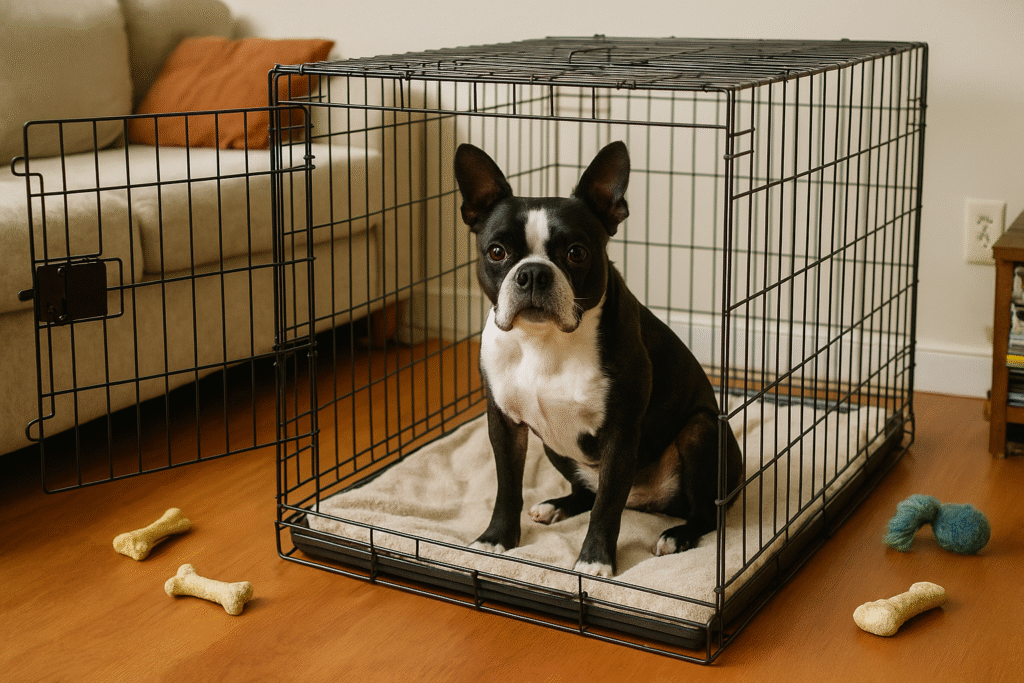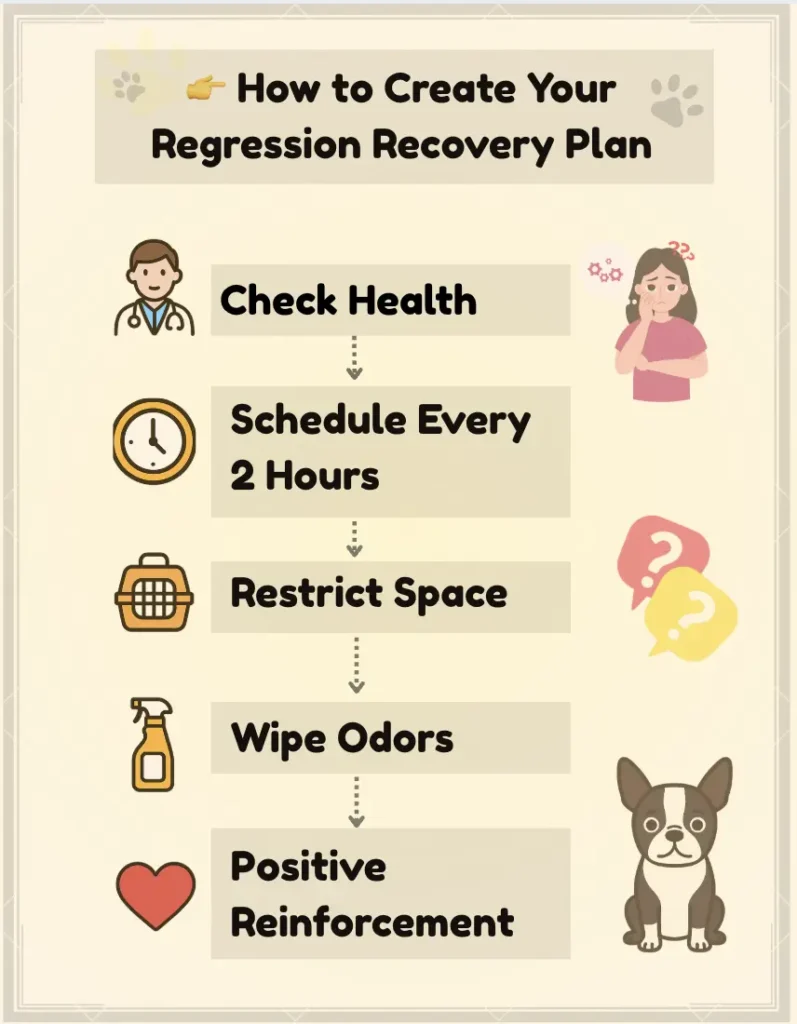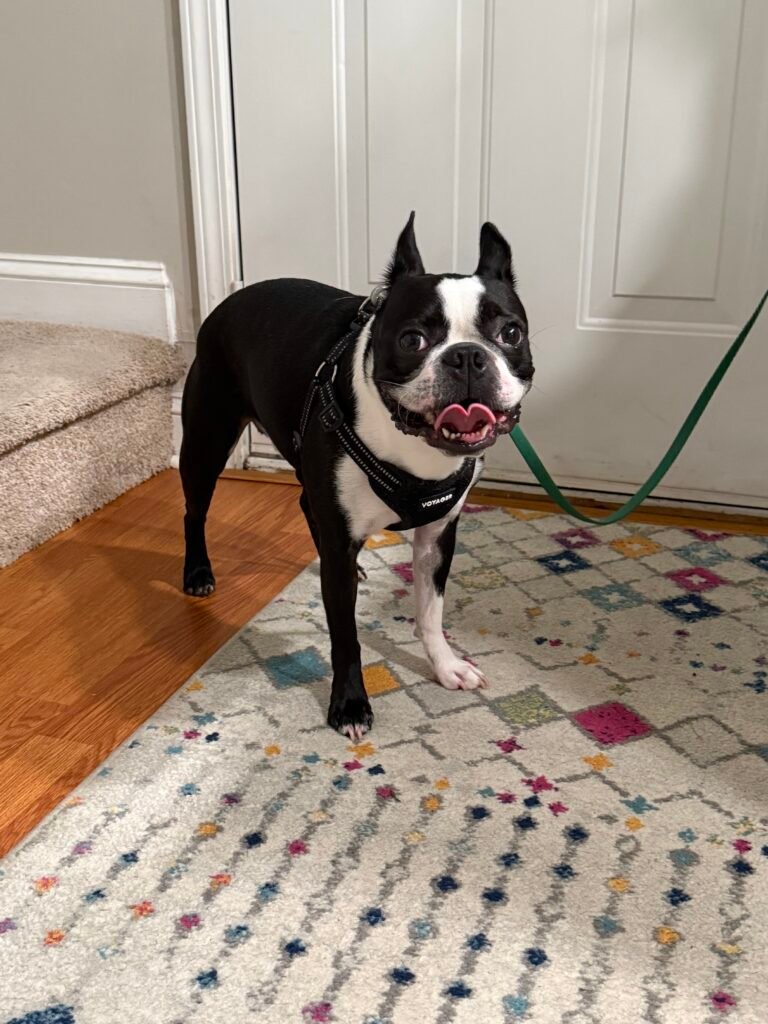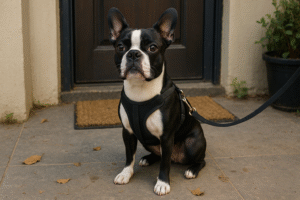Has your Boston Terrier suddenly started leaving puddles around the house, even though things were going smoothly before? I know the frustration all too well – with my Dumpling, it hit a couple of months after we’d nailed the basics, and I nearly lost my mind scrubbing floors. It’s exhausting, especially when it feels like all your hard work has vanished. But here’s the good news: potty training regression is totally normal, and I’ll give you a simple, actionable plan to get things back on track, drawing from my own experiences and expert insights.
A Quick Explanation of the Problem
Potty training regression problems in Boston Terriers often stems from their sensitive nature: the breed is notorious for stubbornness and a fast metabolism, making them prone to “accidents” during stress or changes. Common causes include incomplete initial training, medical issues (like urinary tract infections), stress from moving or a new family member, the adolescent phase where pups get more independent, or simply granting too much freedom too soon. This hits Bostons hard because they’re smart but can “forget” rules if routines slip. Ignoring it can lead to chronic boston terrier house training problems, but prompt action makes a world of difference.
Expert Opinion:
“Often, owners think their puppy is fully trained but give them too much freedom too early, leading to accidents in the house.”— American Kennel Club (AKC).
Step-by-Step Solution
Here’s my battle-tested 5-step plan to tackle regression. I went back to basics with Dumpling, and within a week, we were seeing progress. Each step includes details and my personal take.
- Check Your Dog’s Health. Kick off with a vet visit to rule out medical causes like infections or digestive woes. Bostons are susceptible to UTIs because of their compact size.
My Experience: Dumpling started marking after a move – turned out to be stress, but the vet ruled out health issues. It gave me peace of mind. - Return to a Strict Potty Schedule. Take your dog out every 2-3 hours, especially post-meals, naps, or playtime. Use a cue like “Go potty” and shower praise for success.
My Experience: With Dumpling, I cut intervals to an hour – it rebuilt the habit fast. If it doesn’t click, set phone reminders. - Limit Freedom in the House. Crate or pen your dog when unsupervised. Slowly extend free-roaming time.
Research Says: “In adolescence, puppies might ‘forget’ training, but reverting to routine helps.” — AKC.
My Experience: Dumpling hated the crate at first, but toys inside turned it into a cozy spot. - Thoroughly Clean Accident Spots. Deploy enzymatic cleaners to erase odors – or your dog will revisit them.
My Experience: This was the game-changer for us; lingering scents triggered repeats. - Reinforce Positive Behavior. Praise and treat solely for right actions. Skip punishments.
My Experience: Dumpling responded swiftly to his fav treats (Zuke’s Mini Real Chicken Treats) – motivation reignited our progress.
Tools That Really Help

Here are 2-3 items I’ve tested and swear by for battling regression (boston terrier won’t potty train). Amazon links are affiliate, but only what’s proven effective.
- Rocco & Roxie Stain & Odor Eliminator – Enzymatic cleaner for wiping out urine smells. Why: Erases traces to stop repeat offenses. Price ~$21.
My Micro-Review: We tried it – Dumpling stopped returning to ‘bad’ spots in days. Total lifesaver!
Expert Support: PetMD recommends absorbent, odor-eliminating pads and cleaners for effective training. - Mighty Paw Dog Door Bells – Door bells for your dog to signal needs. Why: Rebuilds communication. Price ~$30.
My Micro-Review: Dumpling mastered it in a week – fewer mishaps, more control.
Expert Support: AKC advises tools like these for solid routines. - Amazon Basics Dog Crate – Crate for space restriction. Why: Safe haven during regression. Price ~$35.
My Micro-Review: Perfect for Bostons – compact, became Dumpling’s ‘sanctuary’.
Common Mistakes and How to Avoid Them
Here are 3 typical slip-ups Boston owners make (are Boston Terriers hard to train? Not always, but mistakes amplify issues).
- Punishing Accidents. Why harmful: Your dog fears you, not learns. Fix: Ignore and clean quietly.
Expert: “Never punish – it slows progress.” — AKC. - Ignoring Stress or Changes. Why: Bostons are sensitive; disruptions spark regression. Fix: Monitor triggers, revert to basics.
- Too Much Freedom Too Soon. Why: Pup isn’t ready. Fix: Expand zones gradually.
Possible Checklist: – Check health. – Shorten intervals. – Erase odors.
How to Create Your Regression Recovery Plan
Want to visualize the process? Here’s a simple how-to for crafting an infographic for your custom plan – it’ll motivate and track progress.

Final Thoughts: Overcome Regression and Restore Joy in Your Home
The key? Don’t blame yourself or your dog: regression (boston terrier potty training issues) is a fleeting hurdle, but with patience, consistency, and the right plan, it’ll resolve swiftly. If I’d known sooner, I’d have checked Dumpling’s health right away – it would’ve spared weeks of aggravation. Good luck, folks – your Boston deserves a flawless, joyful home brimming with affection and clean floors!
If you’re eager to dive deeper into overall potty training, check out our comprehensive guide “The Ultimate Guide to House Training Your Boston Terrier” – it covers everything from start to finish. For related woes like nighttime slip-ups, peek at our piece on nocturnal training, or snag top tools from the potty supplies review – they’ll solidify your success and turn chaos into triumph.
Got a question or a heart-wrenching story of your own? Spill it in the comments – I’ll jump in with powerful tips and support. Share if this transformed your pet life!
FAQ
-
Why is my Boston Terrier experiencing potty training regression around 6-8 months?
Boston Terriers often hit regression during adolescence due to hormonal changes, increased independence, or distractions, leading to sudden accidents even if they were previously trained. It's a common phase where they "forget" routines.
Pro Tip: Tighten your schedule to outings every 1-2 hours and use high-value treats for praise—Bostons respond well to food motivation, cutting recovery time to 1-2 weeks. -
How long does potty training regression last in Boston Terriers?
For Boston Terriers, regression typically lasts 1-4 weeks if addressed quickly, but can extend to 1-2 months in stubborn cases like during teething or if medical issues like UTIs are involved. Boys may take longer than girls.
Pro Tip: Track progress with a daily journal; many owners find that consistent crate use shortens it to under 10 days, especially for this breed's small bladder. -
What should I do if my Boston Terrier was potty trained but now having accidents inside?
his reversion often stems from stress, incomplete initial training, or too much freedom—Boston Terriers are sensitive and quick to slip if routines change. Start by ruling out health problems and reverting to basics.
Pro Tip: Avoid punishment; instead, clean spots with enzymatic sprays and reward outdoor successes lavishly—Bostons thrive on positive reinforcement to rebuild habits fast. -
How can I prevent potty training regression in my Boston Terrier puppy?
Prevention starts with a strict routine from day one, gradual freedom increases, and monitoring for stress triggers—Boston Terriers can regress if overwhelmed by new environments or inconsistent praise.
Pro Tip: Incorporate short, fun sessions daily and watch for signs like circling; early intervention with a vet check can avoid full-blown regression in this intelligent but stubborn breed.




